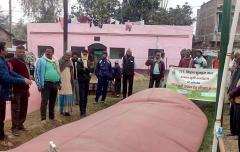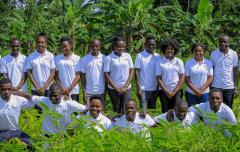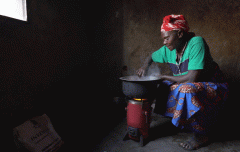Prioritizing reliability: Achieving affordable, reliable, sustainable and modern energy for all by 2030
By Tara Ramanathan, Helena Molin Valdés and Olivia Coldrey
On the first UN International Day of Clean Air for Blue Skies, we recognize that achieving Sustainable Development Goal 7 (SDG7) – affordable, reliable, sustainable and modern energy for all by 2030 - needs to go beyond just distribution of clean cooking solutions. Focusing on the reliability of clean cooking solutions might be a key missing factor in clean energy progress.
On this first United Nations International Day of Clean Air for blue skies, we have the opportunity to reflect on the immediate impact of air pollution and climate change on health and wellbeing. We are seeing the devastating impacts of climate change across the globe, from record-breaking wildfires in California and Australia to massive floods in New Delhi and South Korea. Now more than ever, there is an urgent need to scale up solutions that mitigate the effects of climate change globally, which also improve air quality while reducing emissions from air pollutants like black carbon, methane and tropospheric ozone.
Air pollution is responsible for 7 million premature deaths per year. Household air pollution alone disproportionately impacts women and children’s health and is a main cause of noncommunicable diseases such as stroke, chronic obstructive pulmonary disease, lung cancer and heart disease in low- and middle-income countries. According to the World Health Organization, exposure to household air pollution almost doubles the risk of childhood pneumonia and is responsible for 45% of all pneumonia deaths in children less than 5 years old. At the same time, home cooking, home heating and kerosene lamps account for more than half of global black carbon emissions (a key component of PM2.5 or fine inhalable particles) from anthropogenic sources, which increases the rate of near-term climate change.
Coming clean: Reliability is just as important as distribution
Many of the actors working on clean cooking solutions during the last decade had aimed to clean the air in at least 100 million households by 2020. Science, research, and countless publications support the claim that clean cooking has the potential to protect 2.8 billion people from life-threatening, non-communicable diseases caused by household air pollution, but as a global community we have not been able to actualize these impacts.
The big question is: Why haven’t clean cooking interventions been successful in cleaning the air inside households, even after decades of effort? Most of those who need cleaner cooking live under the poverty threshold, there is a chronic overall lack of funding for the clean cooking sector and low levels of access to affordable solutions. In addition, there is one unsung gap: not all solutions have been reliable. Sustainable Development Goal 7 specifically calls out reliability as one of the four main dimensions for energy for all, stating that “Affordability is meaningless, however, if energy provision is unreliable...Energy should generate a consistent stream of power to meet basic human needs, maintain and improve social functioning, and advance living standards.”
A cooking solution (improved biomass, gas, electric, etc.) is reliable when it offers a household the predictable ability to cleanly cook essential foods on a daily basis and to continue to do so into the foreseeable future. Reliability is a holistic concept that encompasses not only the verifiability of emissions reduction, but also accounts for end users’ needs (e.g. usability of design, long-term durability, affordability, and strength of supply chain). Compromising any of those factors can mean that even if a cooking solution is perceived as beneficial, it may not be well suited and will therefore ultimately not meet its targeted goal of cleaner air.
Nexleaf Analytics has come to this standard of reliability after 10 years evaluating many of the cooking solutions being deployed in India, Nigeria, and Bangladesh, and from listening to and learning from householders and in-country organizations such as Sambhav, Rural Women for Energy Safety (RUWES) and Tata Trusts. The sector has seen time and time again that usage of clean cooking solutions declines over time, as seen in Figure 1 showing the decline in use of an improved forced draft biomass stove.
More recently in 2020, a program that the Climate and Clean Air Coalition (CCAC) supported with Nexleaf Analytics and RUWES (full report here) uncovered the shortcomings of clean biomass stoves (Figure 1) as well as modern energy cooking services such as LPG and ethanol. As indicated in Figures 2 and 3, the use of ethanol and LPG changes from month to month. Some months never show use of these fuels and households used only traditional cookstoves (commonly known as the three-stone fire in Nigeria). Figure 3 shows that with LPG, no more than 40% of households are using LPG more than 1 hour/day in any given month. The drawbacks to LPG varied, from lack of money to purchase fuel to being too small to handle household cooking habits. One woman based in Abuja cited the supply chain as an issue, “The fuel availability is my concern since the fuel is said to be supplied from Lagos." (Lagos is 703 kilometers away from Abuja.) Another household stated, “The fuel is too expensive and I can’t keep up with the constant purchase.”
We are not alone in seeing a clear gap in the reliability of clean cooking solutions. A paper recently published in Nature Energy showed that the Indian government’s PMUY LPG initiative reached more than 80 million new customers with LPG stoves, but that distribution alone was not enough to get to long-term sustained use of LPG.
The only instance that Nexleaf witnessed sustained adoption through their sensor monitoring studies was when the solution was designed based on the local fuel supply and cooking practices of women, and that was the Greenway Jumbo stove in India (Figure 4). Even after two years, this stove was still being heavily used, which is a rare achievement in the clean cookstove sector. However, that stove was not clean enough to tackle climate change and health.
Ethanol, electric cooking, LPG where appropriate and other next generation modern energy cooking solutions offer hope to achieve better environmental and health impacts. What’s also needed to achieve SDG7 by 2030 is reliability.
Three urgent levers to achieve reliable cooking solutions
Getting to reliable clean cooking solutions is complex. It would be much easier to track and invest only in the distribution of those solutions. However, distribution does not in itself result in good health outcomes; sustained performance and consistent usage does. We owe it to the 2.8 billion people, we owe it to the planet, and we owe it to ourselves to go beyond just distribution into reliability which enables consistent usage.
With this, below are three recommend levers to pull:
Glocal: global meets local. Getting to sustainable energy for all is going to require a dramatic shift, where global scale meets local communities. The UN SDG7 website specifically calls this out: “governments and agencies need to work together on international climate change agreements... but this is not enough. Solutions must also be developed locally in impoverished rural areas.” Leaders living in rural areas need to have a seat at the table when it comes to designing and implementing solutions in their communities. Solutions should benefit both health and climate as well as local livelihoods.
Stop, collaborate and listen to women end users. If a woman is not using a clean cookstove or cooking fuel, take that as feedback that the solution was not appropriate for her needs rather than try to convince her to use it. We should practice results-based scale with clean cooking solutions, scaling up only when we know that women like a particular solution and consistently use it. It is crucial to understand the ground realities of day to day life for women end users and their families. Understanding this will bring us closer to finding reliable solutions.
Rapid learning and iteration. The path to accelerate progress for SDG7 is to learn fast and iterate on our solutions. The ground reality data shared in this op-ed was collected quickly because of sensors. But this data alone is not going to solve the issue of reliability. The question then becomes: how do we use tools like sensor data to solve the problems on the ground? With actionable data in hand, we believe stakeholders and country leaders can identify pathways towards more reliable solutions.
What do you think is missing from this list? We want to hear from you. Please contact secretariat@ccacoalition.org and communications@nexleaf.org with your responses and thoughts.
The authors would like to take a moment to thank households that are actively participating as champions of climate change mitigation and taking a chance on the many clean cooking solutions that the sector continues to evaluate. Our sector has learned everything we have because of the families welcoming us into their homes, and for that we owe them the highest quality solutions possible.
Authors
Tara Ramanathan is Director of Clean Energy at Nexleaf Analytics, a nonprofit focused on amplifying the impact of life-saving solutions including the vaccine cold chain and clean cooking. With more than 10 years of experience working with vulnerable populations, Tara always remains focused on her North Star: the women who cook. She has an MBA from University of Oxford Said Business school with an entrepreneurial focus on systems change and business models to scale impactful clean cooking.
Helena Molin Valdés is the head of the secretariat for the Climate and Clean Air Coalition (CCAC), hosted by UN Environment Programme, focusing on scaling up actions to address the multiple benefits of emission reductions from short-lived climate pollutants, including black carbon, methane, tropospheric ozone and HFCs. She is an architect by training and has been a UN executive for over 20 years in areas of disaster resilience, environment and sustainable development.
Olivia Coldrey is Lead, Energy Finance & Clean Cooking at Sustainable Energy for All (SEforALL). A lawyer by training, Olivia has over 20 years experience working at the intersection of law, finance and energy markets.
Photo: Community members in Nigeria inspect a clean cook stove. (Tiy Chung, CCAC)








